On August 13, Israel and United Arab Emirates (UAE) struck a major diplomatic agreement, with a joint Israel-UAE-U.S. statement announcing that in exchange for “full normalization of relations” between the two countries, Israel would forgo, for now, “declaring sovereignty” over disputed territory in the West Bank. Brookings experts on the Middle East analyze the news and its implications.
 Natan Sachs (@natansachs), Director and Fellow in the Center for Middle East Policy: Normalization between Israel and the UAE is an excellent thing, in and of itself. It’s high time these countries have open, normal relations. But the context is of course key: the Israeli plan to annex parts of the West Bank, along the lines to be delineated by the U.S. and Israel after the release of Trump administration plan. The UAE-Israeli-U.S. deal allows everyone to climb down: Israeli Prime Minister Benjamin Netanyahu can avoid the terrible mistake of annexation while claiming he got something big for it (he did!). The UAE can claim it prevented annexation from happening — from UAE Ambassador Yousef Otaiba’s Hebrew-language op-ed warning of the move, to the big carrot of diplomatic normalization. Trump gets to avoid the annexation he himself sanctioned, and all the complications it could have produced, while showing a big win for two of his favorite allies.
Natan Sachs (@natansachs), Director and Fellow in the Center for Middle East Policy: Normalization between Israel and the UAE is an excellent thing, in and of itself. It’s high time these countries have open, normal relations. But the context is of course key: the Israeli plan to annex parts of the West Bank, along the lines to be delineated by the U.S. and Israel after the release of Trump administration plan. The UAE-Israeli-U.S. deal allows everyone to climb down: Israeli Prime Minister Benjamin Netanyahu can avoid the terrible mistake of annexation while claiming he got something big for it (he did!). The UAE can claim it prevented annexation from happening — from UAE Ambassador Yousef Otaiba’s Hebrew-language op-ed warning of the move, to the big carrot of diplomatic normalization. Trump gets to avoid the annexation he himself sanctioned, and all the complications it could have produced, while showing a big win for two of his favorite allies.
There is, of course, something odd about rewarding a non-blunder. Annexation could have been (and perhaps already was) avoided easily with a decision in Washington or Jerusalem alone, but the countries can now move forward with what they’ve long wanted: cooperation among two often-like minded countries, with common regional concerns.
The losers, as often, are the Palestinians. The impatience in the Gulf with the Palestinians now comes to full daylight. The Gulf won’t wait for them any longer, asking of Israel only to avoid declarations of a major change to the status quo.
A question is whether anyone else, and especially the Saudis, might follow. For now, though, the camp of Arab countries with peace or normalization with Israel grows to four: following Egypt (1977), Jordan (1994), and Lebanon, whose nominal leaders signed a meaningless peace treaty with Israel during the Israeli invasion in 1983. This latest agreement to normalize is not nearly as consequential as the first two. Hopefully it will have more meaning than the latter one.
 Bruce Riedel, Senior Fellow in the Center for Middle East Policy: Jordan’s King Abdullah is a big beneficiary of this deal. Annexation of the Jordan Valley by Israel would have required a harsh Jordanian response. The king had pointedly not ruled out suspending the peace treaty his father had signed with Israel 25 years ago. Many Jordanians wanted him to cancel the gas deal with Israel, which would have cost Amman a fortune it doesn’t have. So the suspension of annexation takes a ticking time bomb off the king’s plate.
Bruce Riedel, Senior Fellow in the Center for Middle East Policy: Jordan’s King Abdullah is a big beneficiary of this deal. Annexation of the Jordan Valley by Israel would have required a harsh Jordanian response. The king had pointedly not ruled out suspending the peace treaty his father had signed with Israel 25 years ago. Many Jordanians wanted him to cancel the gas deal with Israel, which would have cost Amman a fortune it doesn’t have. So the suspension of annexation takes a ticking time bomb off the king’s plate.
Adding another (very rich) Arab country to the peace camp, with an embassy in Tel Aviv, is also good for Jordan. It eases the isolation of Amman and Cairo. The king has been praising Muhammad bin Zayed for months.
 Jeffrey Feltman, John C. Whitehead Visiting Fellow in International Diplomacy: Anticipating a potential Joe Biden victory in November, Netanyahu may have had second thoughts about large-scale annexation. But even smaller-scale annexation, while rejected internationally, would have established yet more Israeli facts on the ground that are difficult if not impossible to reverse. The UAE normalization offer provides Netanyahu a ladder to climb down from his annexation tree. Critics complain that this dissolves the Arab solidarity of the 2002 Arab Peace Initiative. But the presumed leverage of the Arab Peace Initiative has never translated into tangible gains for the Palestinians. Suspending annexation at least prevents a bad situation on the ground from becoming worse.
Jeffrey Feltman, John C. Whitehead Visiting Fellow in International Diplomacy: Anticipating a potential Joe Biden victory in November, Netanyahu may have had second thoughts about large-scale annexation. But even smaller-scale annexation, while rejected internationally, would have established yet more Israeli facts on the ground that are difficult if not impossible to reverse. The UAE normalization offer provides Netanyahu a ladder to climb down from his annexation tree. Critics complain that this dissolves the Arab solidarity of the 2002 Arab Peace Initiative. But the presumed leverage of the Arab Peace Initiative has never translated into tangible gains for the Palestinians. Suspending annexation at least prevents a bad situation on the ground from becoming worse.
 Tamara Cofman Wittes (@tcwittes), Senior Fellow in the Center for Middle East Policy: Abu Dhabi and Jerusalem each had their own good reasons for finding a way to open the door to formal relations, but there’s no question the announcement today is also a boon to Donald Trump as he faces a re-election with few concrete accomplishments to his name and many policy failures. Still, the White House should not take too much comfort from this outcome: Among other things, Netanyahu and Emirati Foreign Minister Muhammed bin Zayed (MBZ) have now positioned themselves well for the possibility of a post-Trump Washington. Netanyahu has taken off the table a step that the Democratic presidential candidate has said he firmly opposes, and for which other Democrats in Congress are threatening to impose consequences. And MBZ has taken a step that can only win praise and plaudits from any incoming U.S. administration, while separating his nation from Saudi Arabia in the minds of Democrats who are ill-disposed to Riyadh. It seems both Bibi and MBZ have placed their bets for November.
Tamara Cofman Wittes (@tcwittes), Senior Fellow in the Center for Middle East Policy: Abu Dhabi and Jerusalem each had their own good reasons for finding a way to open the door to formal relations, but there’s no question the announcement today is also a boon to Donald Trump as he faces a re-election with few concrete accomplishments to his name and many policy failures. Still, the White House should not take too much comfort from this outcome: Among other things, Netanyahu and Emirati Foreign Minister Muhammed bin Zayed (MBZ) have now positioned themselves well for the possibility of a post-Trump Washington. Netanyahu has taken off the table a step that the Democratic presidential candidate has said he firmly opposes, and for which other Democrats in Congress are threatening to impose consequences. And MBZ has taken a step that can only win praise and plaudits from any incoming U.S. administration, while separating his nation from Saudi Arabia in the minds of Democrats who are ill-disposed to Riyadh. It seems both Bibi and MBZ have placed their bets for November.
The big losers in today’s announcement, of course, are the Palestinians — who are supposed to be grateful at being spared a de jure annexation of territory in the West Bank that many would say has been in place de facto for years already. Abu Dhabi, like Anwar Sadat’s Egypt in 1978, is putting its national interests above Arab solidarity with the Palestinian cause. The Emiratis are betting they can easily weather the storm of unwelcome reactions in the Arab world — and they have far more reason than Sadat did to make that judgment.
The dynamic between the Palestine Liberation Organization (PLO) and the Arab states has been shifting for a long time. Ever since the end of the Cold War and the Gulf Crisis 30 years ago, Arab governments have become less concerned about Israel’s impact on regional stability and more focused on Iran and on their own internal troubles. Palestinian politics have become fractured, and have also been caught up in the regional power rivalries that now obsess Abu Dhabi and other capitals.
When the Arab Peace Initiative was launched in 2002, amidst the violence of the second intifada and Israel’s reoccupation of Palestinian cities in the West Bank, the assembled Arab governments in Beirut put the power of the Arab states’ normalization offer at the service of the beleaguered Palestinians, led by Yassir Arafat. Today’s announcement cements a reversal of the dynamic. Now the Emiratis can claim that they have saved Palestine from annexation, when what they’ve really done is used a suspension of annexation (which was probably suspended anyway) as cover for their pursuit of their own national interests in ties with Israel. Palestinian leader Mahmoud Abbas may not be able to do much about this betrayal of Palestinian interests — but Palestinians will remember.
 Suzanne Maloney (@MaloneySuzanne), Interim Vice President and Director of the Foreign Policy program: The historic breakthrough between the United Arab Emirates and Israel would not have come without an assist from Iran’s Islamic Republic. The quiet ties developed over years of pragmatic cooperation between Israeli and Emirati officials around the threats posed by Tehran helped to overcome one of the most stubborn diplomatic schisms. The Israeli government’s suspension of the immediate threat of annexation was a relatively small price to pay in exchange for formalizing its security partnership with the Gulf states, and the move positions both countries — as well as those who may follow the Emirates’ lead — to simultaneously curry favor with the Trump administration, which sorely needed some tangible diplomatic achievement, as well as a possible Biden administration that would be more hostile toward the prospect of annexation.
Suzanne Maloney (@MaloneySuzanne), Interim Vice President and Director of the Foreign Policy program: The historic breakthrough between the United Arab Emirates and Israel would not have come without an assist from Iran’s Islamic Republic. The quiet ties developed over years of pragmatic cooperation between Israeli and Emirati officials around the threats posed by Tehran helped to overcome one of the most stubborn diplomatic schisms. The Israeli government’s suspension of the immediate threat of annexation was a relatively small price to pay in exchange for formalizing its security partnership with the Gulf states, and the move positions both countries — as well as those who may follow the Emirates’ lead — to simultaneously curry favor with the Trump administration, which sorely needed some tangible diplomatic achievement, as well as a possible Biden administration that would be more hostile toward the prospect of annexation.
Tehran has already responded with predictably scalding rhetoric, no doubt hoping to exploit residual support for the Palestinian cause among Arab public opinion to enhance its own regional reach. For that reason, some within the Islamic Republic will view this as a victory for the regime’s abiding ideological opposition to Israel, especially since today’s move was preceded by a thaw in the Emirates’ approach to Tehran and coincided with the Iranian foreign minister’s triumphal visit to a shattered Lebanon. But for all the fulminations that will be delivered at Friday prayers around Iran, the creeping normalization of Israel within the Arab world exposes the fundamental disconnect between Tehran and the region it seeks to dominate. And even as Iranians wait expectantly for the prospect of a diplomatic opening under a more sympathetic Biden administration, the landmark new ties between the Emirates and Israelis mean that the strategic and financial environment will remain challenging for Iran no matter what happens in November.
 Shadi Hamid (@shadihamid), Senior Fellow in the Center for Middle East Policy: In theory, who can argue against peace? In practice and principle, though, Israel is being rewarded for not doing something it should have never considered doing in the first place — annexing parts of the West Bank. This isn’t diplomacy, and it isn’t peace. It’s cynical, and it shows, once again, that Arab authoritarian regimes can’t be bothered to pretend they care about Palestinian rights. For the UAE, it’s a means to an end, formalizing increasingly warm feelings toward Israel, due to their shared enemy of Iran and their shared (and unusual) preference for President Trump over President Obama.
Shadi Hamid (@shadihamid), Senior Fellow in the Center for Middle East Policy: In theory, who can argue against peace? In practice and principle, though, Israel is being rewarded for not doing something it should have never considered doing in the first place — annexing parts of the West Bank. This isn’t diplomacy, and it isn’t peace. It’s cynical, and it shows, once again, that Arab authoritarian regimes can’t be bothered to pretend they care about Palestinian rights. For the UAE, it’s a means to an end, formalizing increasingly warm feelings toward Israel, due to their shared enemy of Iran and their shared (and unusual) preference for President Trump over President Obama.
The word “authoritarian” is worth highlighting here. It’s hard to imagine an Arab country, if it were democratic, striking a peace deal with Israel today. Whether that’s a strike against — or for — democracy is another question. Of course, it’s not exactly an accident that Israel, one of the region’s few democracies, prefers that its Arab neighbors not be democratic, and the deal with the UAE is a reminder why.
 Salam Fayyad, Distinguished Fellow in the Foreign Policy program: Yet another sign of bad times. Little did Arab leaders know, when they adopted the Arab Peace Initiative some 18 years ago, that normalization for withdrawal from the occupied Arab territories would turn into normalization for a mere suspension — read: deferment to a more opportune time — of further formal annexation of West Bank territory. Israel got itself a huge prize for merely temporarily refraining from committing another egregious violation of international law.
Salam Fayyad, Distinguished Fellow in the Foreign Policy program: Yet another sign of bad times. Little did Arab leaders know, when they adopted the Arab Peace Initiative some 18 years ago, that normalization for withdrawal from the occupied Arab territories would turn into normalization for a mere suspension — read: deferment to a more opportune time — of further formal annexation of West Bank territory. Israel got itself a huge prize for merely temporarily refraining from committing another egregious violation of international law.
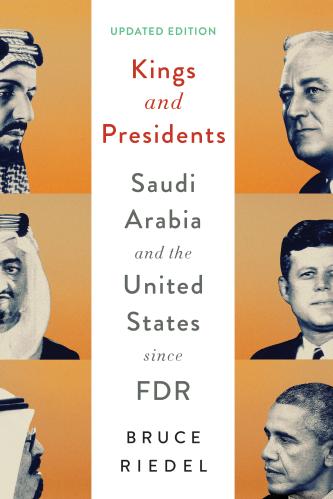
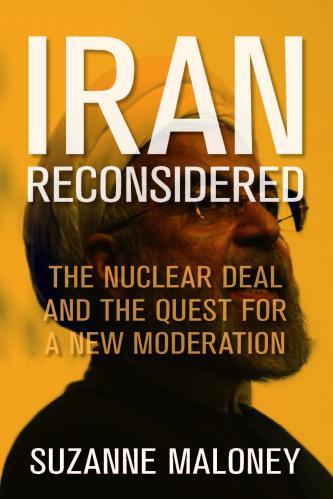
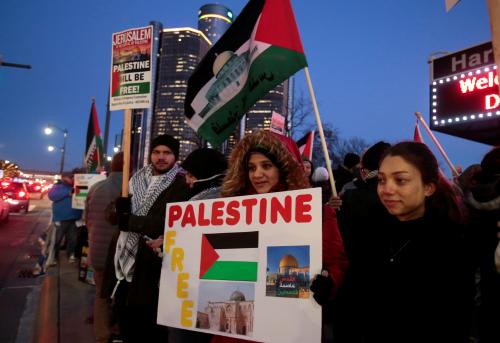
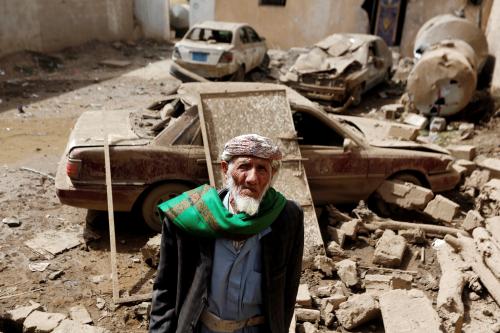






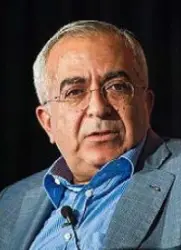



Commentary
Around-the-halls: Experts analyze the normalization of Israel-UAE ties
August 13, 2020